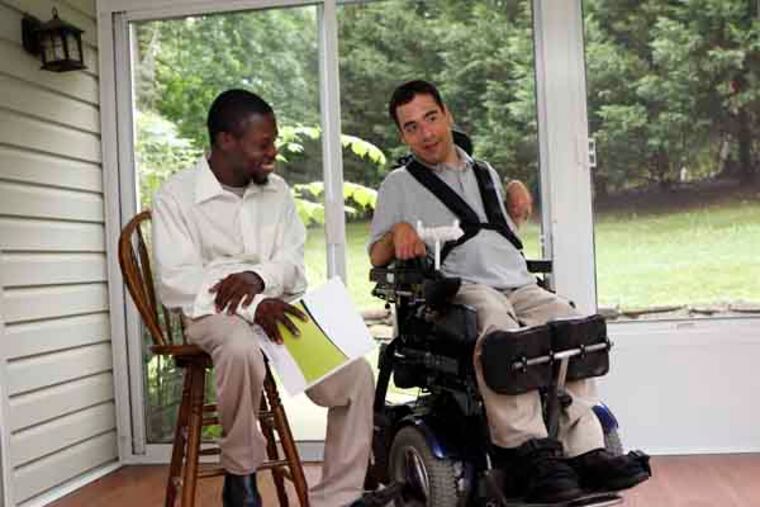Help with managing finances for people with disabilities
This piece of financial common sense might appear to be elementary: Never give out your ATM personal identification number. But if you're Michael Anderson, it's not so elementary. Anderson, 31, of Merion, has cerebral palsy.

This piece of financial common sense might appear to be elementary: Never give out your ATM personal identification number.
But if you're Michael Anderson, it's not so elementary. Anderson, 31, of Merion, has cerebral palsy.
Who but someone with Anderson's PIN could withdraw money for a man who uses a wheelchair and has limited use of his hands?
And yes, he's been robbed by one of his attendants.
Susan Tachau has seen this time and time again with many of her clients - and several times with Anderson, who is her son. As Tachau has counseled people with disabilities, she has discovered cases in which they have been ripped off and failed to realize it until their accounts have been emptied.
Many have minimal knowledge of personal finance.
So Tachau, who heads a nonprofit that helps people with disabilities connect with technology, joined with several professors at Widener University in Chester to help create Cents and Sensibility, a free money-management guide for people with disabilities.
"Part of the problem is that people don't know this stuff. Their families completely take care of them," said Tachau, executive director of the Pennsylvania Assistive Technology Foundation.
Some have bad credit or no credit, said Tracy Beck, the foundation's director of operations. They've never been inside a bank. They don't understand the concept of a loan. They don't know how to protect themselves from being victimized.
In Cents and Sensibility, professor Caryl Carpenter, associate professor Dennis Laker, and instructor David Haman, a certified financial planner, offer a primer on personal finance.
The guide includes basic information such as the definitions of credit and credit score. It offers interactive programs to help readers create a budget, and suggests ways to save money for readers who are on government assistance, which involves strict regulations about income.
The guide, which cost $60,000 to produce, was funded by the foundation and donations from Inglis House, a Philadelphia residence for people with disabilities; the Pennsylvania Credit Union Foundation; the Pennsylvania Housing Finance Agency; and private contributions.
For Anderson, who lives independently with two housemates who have disabilities, the problem came in failing to keep tabs on his account.
"It's not reasonable to tell someone like Michael not to give out your PIN," Tachau said, "But there's safety in getting a receipt for all transactions and checking your statement regularly."
The handbook's release coincides with a philosophical shift regarding the lives of people with disabilities that encourages independence rather than living in facilities, Laker said. Yet paternalism remains an issue.
"I went to the Widener School for people with disabilities, and there was a perception that children with disabilities would be taken care of the rest of your life," said Matthew Saunders, 28, of Philadelphia, who also has cerebral palsy. "But I did have one teacher who told us about endorsing a check."
Saunders, who works in casino surveillance, borrowed money for student loans without a clear understanding of what he was getting into - mistakenly thinking he had signed up for both loans and grant money.
Some problems people with disabilities encounter are rooted in a financial industry largely lacking in procedures that consider the situations of people with disabilities, said Suzanne Erb, who is blind.
"Those numbers on the back of your credit card? The three? They are not even tactile, so [I] can't even read them," said Erb, 57, of Philadelphia.
"And if you call the bank to try to get the info, they won't give it to you," Erb continued. "They ask, 'Don't you have somebody you can trust?' "
Maybe, maybe not, Tachau said. People with disabilities have been scammed by members of their own families who are in charge of their finances, Tachau said.
The guide's authors have distributed the book through social and government agencies. It is also available online to download free (visit www.patf.us).
The next step is to adapt the guide to an interactive online format and add a braille version.
"People [with disabilities] should have everything they need in order to live and work independently, and to participate to the fullest extent in society," Erb said, "and you can't really do that unless you have the ability to manage your own finances."